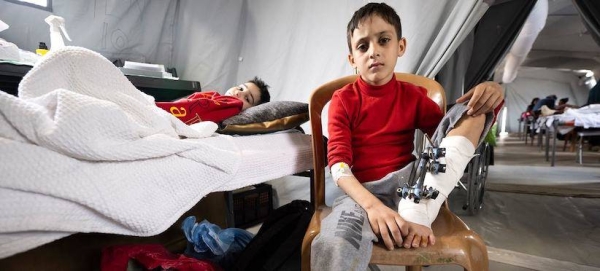
Iraq’s Parliament to discuss unrest; demonstrators storm Iranian Consulate in southern oil hub
Prime Minister Haider Al-Abadi and a number of key ministers are to attend the session
BASRA: Iraqi religious leader Ayatollah Ali Sistani has called for a political shake-up in Baghdad and a halt to violence against demonstrators on Friday, after days of deadly protests tore through the main city in the south and shut the country’s main seaport.
Ayatollah Ali Sistani placed blame for the unrest with political leaders and said a new government should be formed, “different from its predecessors.”
At least 10 protesters have died since Monday in Basra, a city of 2 million people where residents who complain that infrastructure has collapsed — leaving them with no power or safe drinking water in the heat of summer — have torched government buildings and clashed with security forces.
On Thursday, demonstrators escalated the unrest by shutting down Umm Qasr, the country’s main seaport, 60 km south of Basra, which handles the vast majority of imports into a country dependent on food bought abroad to feed its 37 million citizens.
It remained shut on Friday, local officials and security sources said. Iraq’s oil exports, which are carried out from offshore platforms, were unaffected.
Inside Basra, protesters stormed several provincial government buildings, torched the headquarters of the local government and blocked main roads in the city center.
Iraq’s politicians have so far failed to agree on a new government after an inconclusive election in May. The new Parliament finally met on Monday for the first time, but broke up after a day with no faction assembling enough votes to elect a speaker much less name the next prime minister.
In his Friday prayer sermon read out by an aide, Sistani demanded an end to the use of violence against “peaceful protests” and placed the blame squarely on politicians for corruption and unemployment.
“The failings of Iraqi political leaders in recent years have caused the anger of people in Basra,” Sistani said.
“This reality cannot change if the next government is formed according to the same criteria adopted when forming previous governments. Pressure must be exerted for the new government to be different from its predecessors.”
Parliament’s interim leader summoned lawmakers to an emergency session on Saturday to discuss the unrest.
Also on Friday, local security sources said protesters stormed the Iranian Consulate in Basra. The consulate is in the upscale neighborhood of Al-Barda’iya, southeast of the city center.
Iraqi factions mainly came together during a 2014-2017 war against terrorists who seized large swathes of the country’s north.
Its two most influential allies, Washington and Tehran, also backed the Baghdad government despite their deep hostility toward each other.
But since Daesh was largely defeated last year, other divisions have re-emerged. Shiites in the south, where most of Iraq’s oil wealth is produced, say Baghdad politicians have squandered state funds while leaving them desperate.
Moqtada Sadr,whose electoral bloc came first in May’s election, said on Twitter that Prime Minister Haidar Abadi must release more funds for Basra to improve conditions there.
Sadr, the former leader of an anti-American sectarian militia who has reinvented himself as an anti-corruption campaigner, has allied himself with Abadi.
Their alliance is competing to form a government against a rival bloc backed by Abadi’s predecessor Nuri Al-Maliki and the leader of an Iran-backed Shiite armed group, Hadi Al-Amiri.
Sadr called on Thursday for an emergency parliament session and for Abadi and other senior officials to attend. Abadi said he would do so.
Amid the political crisis and worsening protests in Basra, security forces have launched a search operation to determine the source of three mortar shells that landed inside Baghdad"s heavily fortified Green Zone.
Iraq’s newParliament faces the twin tasks of rebuilding the north of the country following the war against Daesh and rehabilitating services in the south, where severe water and electricity shortages have fueled protests.












